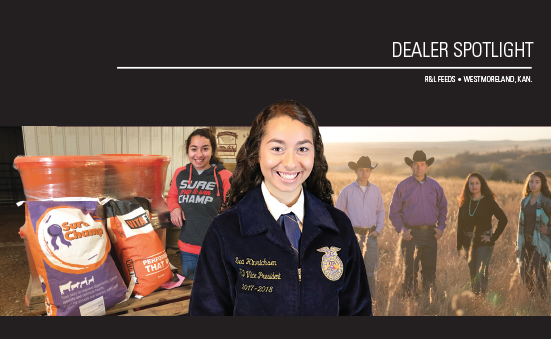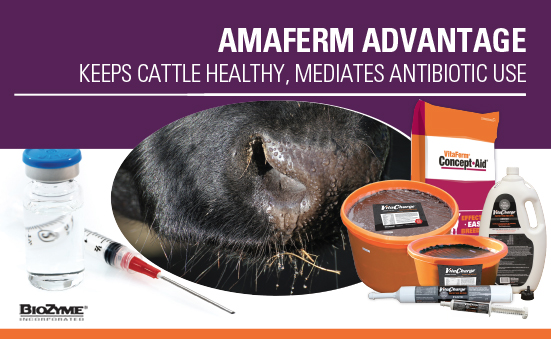Adolescence can be a scary time in a young person’s life. High school is busy with homework, FFA and cheerleading. Serving as the Northeast Kansas FFA Vice-president, Kansas Angus Association Ambassador, working cattle with family and going to shows takes up a lot of time. Those activities might seem like enough to keep a junior in high school busy, but add in a BioZyme® dealership, and you’ve got the life of 16-year-old Eva Hinrichsen of R&L Feeds near Westmoreland, Kan.
Eva, whose parents, Ron and Lynne, have been BioZyme dealers for nearly five years, decided she would like to take over the dealership and make it her FFA SAE (Supervised Agriculture Experience). She had total support from both her parents and her FFA advisor.
“My dad has been in sales pretty much his whole career and I always thought it was interesting,” Eva said. “I wanted to develop more sales skills and help with my business management skills and this is a different way to get an opportunity to do that.”
While it was slightly daunting for her at first, Eva said the positives definitely outweigh the bad. She has honed in on her sales skills and increased her product knowledge, which was the biggest challenge she faced.
“I was a little nervous at first because I was so young to be doing this,” she said. “I didn’t know how it was going to work out trying to talk to producers about changing their mineral. It was a little nerve-wracking. I just try to convince them to spend a little more money so they have a better return on their investment, and I think I’ve been pretty successful at that. It’s been a great opportunity, and it’s been fun to do that.”
Eva has set goals for both R&L Feeds and her SAE. For her business, she wants to increase the total tonnage she sells on annual basis and expand her product line. For her SAE, she wants the project to be successful and show some revenue. She said there is a lot of records to keep with both.
Initially nervous, Eva says she now talks to producers with ease, and that they have been pretty friendly. She takes advantage of the weekends and evenings to do most of her work for the dealership, and makes contact with a lot of her customers at the cattle shows she and her family compete at on weekends. One of her highlights so far, has been attending a new dealer orientation.
“Getting the knowledge has been beneficial to me owning cattle myself. I went to Saint Joe and went to a class with other dealers, and I learned about the Amaferm® advantage and how that can increase the digestibility, and how gut health increases immunity. All that helps increase genetic potential. So that has been helpful for me when developing my own feed rations,” she said.
Eva encourages others who are interested in starting a business or becoming a dealer to find the courage to do so.
“It’s a little scary at first because you know you aren’t going to be as good as the trained, older dealers, but it is fun, and I’ve really enjoyed being able to do this.”






